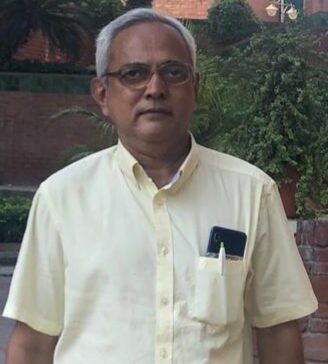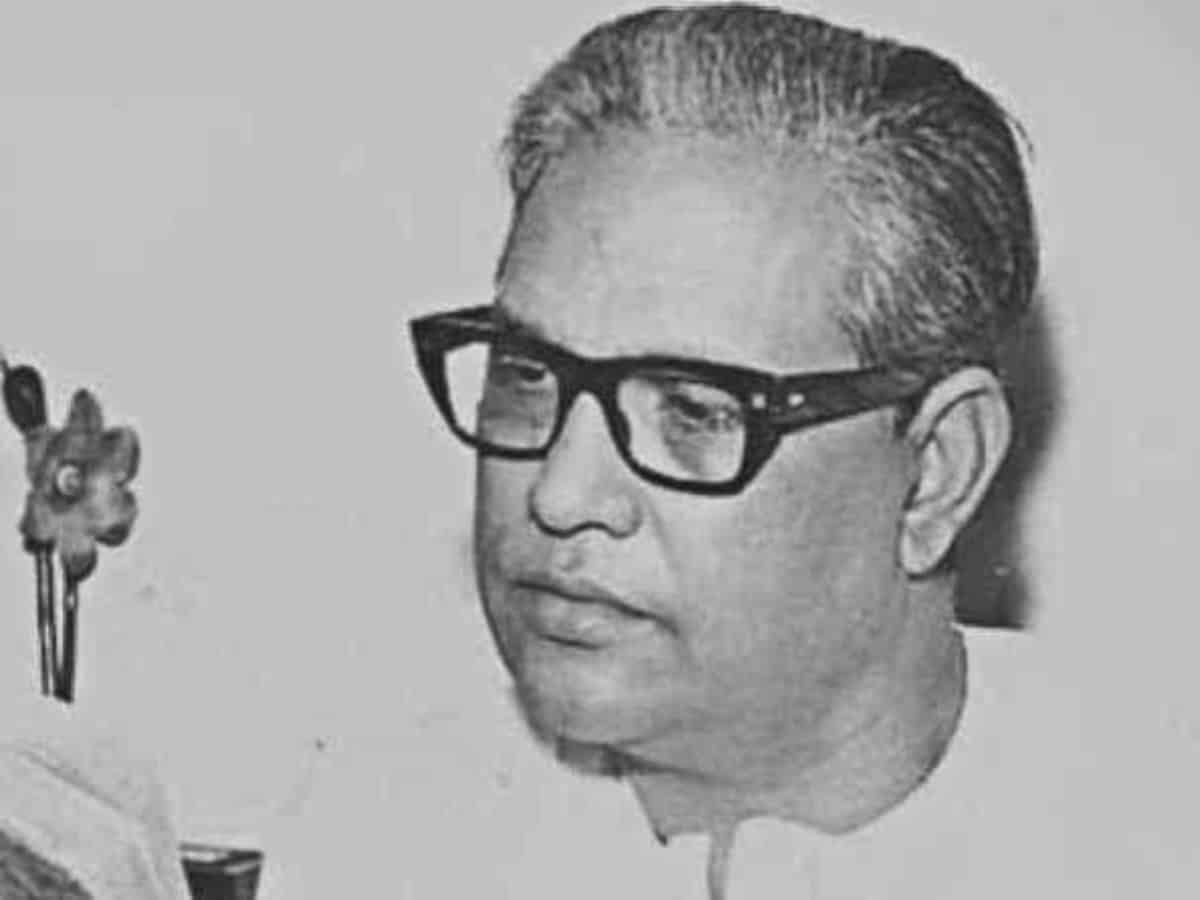
Main akela hi chal pada jaanib-e-manzil magar
Log saath aate gaye, aur Caravaan banta gaya
(I set out all alone on the march towards my destination/People started joining me and the Caravan was formed).
Rarely it happens that a couplet becomes so immensely popular, but no one seems to be sure of its author. This couplet of Majrooh Sultanpuri fired the imagination of many a political leader. Himself a Progressive Poet, staunchly attached to the Taraqqi Masand Tehreek, or the Progressive Writers Movement and a confirmed Communist, Majrooh Sultanpuri lived up to his reputation of being a Rebel with a Cause, gathering a huge fan-following, as he progressed in his poetic quest.
Significantly, as Finance Minister in P V Narasimha Rao Government, Dr Manmohan Singh invoked this couplet in Parliament. This was sometime shortly after the Narasimha Rao Government won the crucial Vote of Confidence in 1993. Dr Manmohan Singh meant to say that despite initial scepticism about Reforms, people slowly started joining ranks and the Reforms process gained momentum.
Expectedly it raised hackles in Parliament.
Since this happened just in the aftermath of the crucial Vote of Confidence in 1993, when the then Lok Sabha Speaker Shivraj Patil gave the famous ruling that split in a political party is a continuing process, it raised eyebrows.
So, politically it was understood as Opposition MPs breaking away to join in the ruling party, thus ensuring that the Caravan of Narasimha Rao Government moved on! It created quite a commotion in Parliament.
Majrooh Sultanpuri became the first lyricist to be picked up for the prestigious Dada Saheb Phalke Award in 1993. It shows the extent to which he earned the admiration of the people from all walks of life.
In fact, Ramu Damodaran, the redoubtable Indian Foreign Service (IFS) officer, who served as Private Secretary to Prime Minister P V Narasimha Rao, is credited with mooting the name of Majrooh Sultanpuri for the prestigious Dada Saheb Phalke Award. The choice of a lyricist was accepted by Narasimha Rao and in 1993, Majrooh was conferred with the greatest honour of the Indian Cinema. Perhaps, but for Ramu Damodaran, possibly Majrooh may very well have missed this great honour.
Physician-turned-Poet
Born Asraar-ul-Hassan Khan in a village in Sultanpur district in Uttar Pradesh on October 1, 1919, he was imparted education in Arabic, Persian and in Deeni Taaleem, or religious education. Later on, he went on to become a Hakeem, or trained doctor in Unani Medicine. But the Poet, lurking deep inside him, forced his hand to take to writing poetry.
He took the pen-name of Majrooh Sultanpuri. Maj means wounded and rooh is soul, Wounded Soul, and Sultanpuri because he hailed from Sultanpur district in Uttar Pradesh. That was the trend those days to include in the name the native place. Others of his ilk included Sahir Ludhianvi, Shakeel Badayuni Qamar Jalaalabadi, Assad Bhopali, Naqsh Lyallpuri and Hasrat Jaipuri.
Majrooh always insisted that primarily he is a poet, only then a lyricist: Main ibtidayee taur pe shayar hoon, phir ek naghmanigaar. He would say that he would pick up the pen only when he is sure of the proper arrangement of words: Qalam tab hi haath mein leta hoon, tarteeb se jab alfaaz saj te hain.
He went on to assert, in poetry, choice of words is a necessary precondition: Shayari mein intaqaab-e-alfaaz shart-e-awwal hai. A popular Ghazal of his has it,
Jala ke mashal-e-jaan hum junu sifat chale
Jo Ghar ko aag lagaye woh humaare saath chale
Dayaar-e-shaam nahi, manzil-e-sehar bhi nahi
Ajab nagar hai, yahaan din chale, na raat chale
Humaare lab na sahi, woh dahaan-e-zakhm sahi
Wahin pe pahunchi hai yaaron, kahin se baat chale
Sutun-e-daar pe rakhte chalo saron ke charaagh
Jahaan talak sitam ki siyaah raat chale
Bula hi baithe jab Ahl-e-haram to aie Majrooh
Bagal mein hum bhi liye ek sanam ka haath chale
Mushaira in Mumbai
Majrooh’s poetic quest took him to Mushairas. It was during one of his poetry recitations in a Mushaira in Mumbai that Majrooh Sultanpuri really made a mark.
Present in the Mushaira was the renowned filmmaker A R Kardar, who took fancy for Majrooh’s compositions. Kardar tasked Jigar Moradabadi to contact Majrooh Sultanpuri to write for films.
A proud poet, Majrooh was highly reluctant to write for films. Jigar Moradabadi succeeded in convincing Majrooh to write for Hindi films, as there is money in it.
Master of Ghazal, Majrooh introduced it in the world of Hindi Cinema. The likes of Rajender Krishan, Hasrat Jaipuri and Raja Mehdi Ali Khan duly carried it forward.
In Shah Jahan, made in 1946, he brought in Ghazal, like, Gham diye mustaqil, kitna naazuk hai dil, yeh na jaanaa, haaye, haaye yeh zaalim zamana. Another song of his, Jab dil hi toot gaya, hum jee ke kya karenge was liked by K L Sehgal so much that he wanted this song to be played in his funeral.
Musical Sense
At a Mushaira at the Eid-Gaah in Bhopal in 1972, he declared:
Mausiqi meri ragon mein, Shayari mere dil mein
Baste hain mere naghme, Dil-e-bismil mein
(Music in my veins/Poetry in my heart/My songs reside/In a wounded heart)
It is this natural musical sense and poetic impulse that conferred immortality on his Hindi film songs.
Consider this. Aankhon se jo utre hain dil mein, tasveer hai ek anjaane ki, khud dhoondh rahe hain shama jise, kya baat hai us parwaane ki and Zulf ki chhaaon mein chehre ka ujaala lekar, teri veeraan si raaton ko sajaya humne (Phir Wohi Dil Laya Hoon); Jaaiye aap kahaan jaayenge, yeh nazar laut ke phir aayegi and Roka kayee baar maine dil ki umang ko, kya karun main apni nighaaon ki pasand ko, Oh! jaan-e-jaan, tu hi mere pyaar ka jahaan hai (Mere Sanam); Thehriya hosh mein aalun to chale jaaiyega (Mohobat Isko Kahte Hain); Kaisa jaadu balaam tu ne daaraa, kho gaya nanha sa dil humara (12 0′ Clock); Jaag dil-e-diwana, rut jaagi, vasl-e-yaar ki (Oonche Log); and Dil beqaraar sa hai, hum ko qumaar sa hai, jab se tum he dekha sanam (Ishara).
Sahir & Majrooh
Sahir Ludhianvi, himself a master Poet-Lyricist and a contemporary of Majrooh, once said, “I have always strived to bring song-writing close to literary poetry and use it to provide political and social perspectives to people.” Sahir believed film songs made poetry accessible even to illiterate film-goers. He incorporated many of his poems and Ghazals in Hindi films.
While Sahir tried to maintain literary depth and dignity in his film songs, Majrooh had felicity of expression and a capacity to capture the imagination of the people.
Majrooh Sultanpuri had the musical sense and the poetic impulse that made his Hindi film songs really Immortal.
Writing poetry is one thing, but matching it to a musical tune is that much more challenging. When introduced to Music Director Naushad Ali, Majrooh Sultanpuri was asked to compose a mukhda to a given tune. Majrooh came up with the line, Jab usne gesu bhikhraaye, baadal aaye jhoom ke. Naushad was impressed. The song was sung by Shamshad Begum.
Majrooh was signed up to write songs for Shah Jahan in 1946, which became a runaway musical hit. His musical journey started on a heady note and he never looked back.
In 1949 came Andaz, which turned out to the biggest musical hit.
He is the one lyricist to take the poetic liberty to even split a phrase. The common phrase is aar-paar. In the film Aar-Paar, made in 1954, he wrote the song, Kabhi aar, kabhi paar, laga teer-e-nazar. The same film had a memorable song, Babuji dheere chalna, pyaar mein zara sambhalna.
In Sujata, made in 1959, he had composed the magical song, Jalte hain jiske liye, teri aankhon ke diye, dhoondh laya hun wohi geet main tere liye.
Majrooh was so romantic to the core that he came up with stirring lyrics. In his song in Phir Wohi Dil Laya Hoon in 1963, Aankhon se jo utren hain dil mein, there are these lines: Andaaz woh uske aane ka, chhup ke se bahaar aayee jaise, kahne ko ghadi bhar saath raha, par umr ghuzara jaise, unke bina, rahungi nahi, qismat se, ab jo kaheen, mil jaaye khabar deewaane ki….
In yet another song, Zulf ki chhaaon mein chehre ka ujaala lekar, teri veeraan si raaton ko sajaya hum ne, in the same film, there are these lines, Hum ne har dil ko sikhaayaa hai dhadhak ne ja chalan, deke ulfat ki tadap, deke mohobat ki jalan, tujh se deewaane ko insaan banaya hum ne…..
It goes on: Seekh le rasm-e-wafa husn bhi deewaane se, Daastaan apni bhari hai inhi afsaanon se, Rakh diye sar jo jahaan phir na uthaya hum ne, Teri raaton ke liye dil ko jalaya hum ne.
In his song in Ishara, in 1964, Dil beqaraar sa hai, there are these lines: Jab tak nighaaon se teri, dil ki mulaaqaaten na theen, jeene ko jee le te magar, yeh rang, yeh baaten na theen, ab hum ne jaana baat kya hai, in nighaaon ki qasam….
In Mere Sanam in 1965, he could invest even an item number with grace, like Yeh hai reshmi zulfon ka andhera, na ghabhraiye, jahaan tak mehak hai meri gesuon ki, chale aaiye.
Even such a Poet could walk in step with the times. In Shagird in 1967, using contemporaneous words in the song, Bade Miyan deewane aise na bano, Majrooh tried to be trendy.
Seekho kartab naye-naye
Fashion ke dhang naye-naye
Dheela-dhala libas kyun
Resham pehno, kapaas kyun
Fan yeh jaadugari ka hai
Armaan tumko Pari ka hai
To Qibala, maaro Mantar, tedhi bankar
Niklo waqt-e-shaam
Bade miyan deewane, aise na bano
Haseena kya chaahe, hum se suno
In Dastak, made in 1970, he came up with Hum hain mata-e-kucha-o-baazaar ki tarha, uth ti hai har nigaah khareedaar ki tarha. The maqta has it: Majrooh likh rahe hain woh ahl-e-wafa ka naam, hum bhi khade huve hain gunahgaar ki tarha.
In Qayaamat Se Qayaamat Tak in 1988, Majrooh came up with yet another trendy song, Papa kahte hain bada naam karega, Beta humara aisa kaam karega.
Lyricist was a secondary role for him. Primarily a Poet, he was a revolutionary at heart.
Dekh zindan se pareh, rang-e-chaman, josh-e-bahaar
Raqs karna hai, to paun ki zanjeer na dekh.
Look beyond the prison walls to see the colour of flowers, the fervour of Spring. If you want to dance, don’t look at the shackles on your feet.
Venkat Parsa is a senior journalist and writer based in New Delhi.
Views expressed are personal

